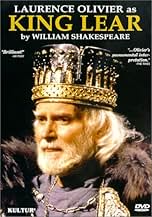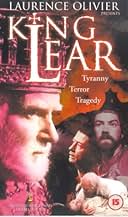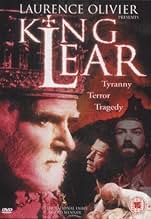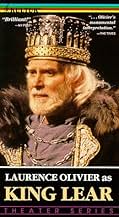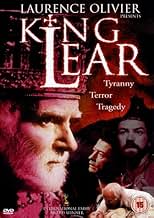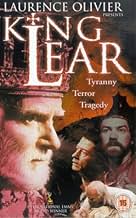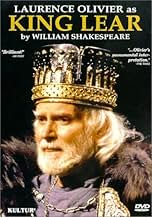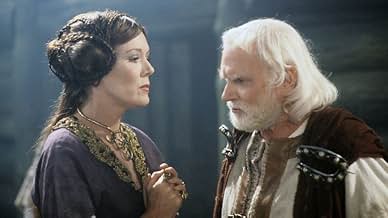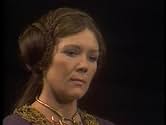Füge eine Handlung in deiner Sprache hinzuAging King Lear invites disaster when he abdicates to his two disloyal and obsequious daughters while rejecting the one who truly loves him.Aging King Lear invites disaster when he abdicates to his two disloyal and obsequious daughters while rejecting the one who truly loves him.Aging King Lear invites disaster when he abdicates to his two disloyal and obsequious daughters while rejecting the one who truly loves him.
- 1 Primetime Emmy gewonnen
- 2 Gewinne & 3 Nominierungen insgesamt
Empfohlene Bewertungen
10Sirona
The whole production was beclouded with grayness, as suits the theme of seeing/sight, yet the acting was elegiac. Diana Rigg and Dorothy Tutin were as seeming kindly as they were brutal. Robert Lindsay's Edmund was as poisonous as he was seemingly loving and loyal. But what I take away most specially was Olivier, as Lear, lifting a lock of his dead Cordelia's hair in his bowed hands to his face, taking a breath, a last scent. I cried. It was a most elegant summary of a parent's loss.
This TV production was Laurence Olivier's final great performance, playing Lear at the age of 75 (beyond him perhaps on stage but cleverly done here).
He is supported by a large cast of stage actors - Dorothy Tutin, Anna Calder-Marshall and Diana Rigg as his daughters; Robert Lindsay and David Threlfall as the warring brothers Edmund and Edgar; Colin Blakely as Kent; Leo McKern as Gloucester; John Hurt as The Fool - all of which make their impact. The staging is memorable and pulls the viewer in to the action.
Comparable to really being there watching the greats at work in the theatre, and a fantastic piece of television drama.
He is supported by a large cast of stage actors - Dorothy Tutin, Anna Calder-Marshall and Diana Rigg as his daughters; Robert Lindsay and David Threlfall as the warring brothers Edmund and Edgar; Colin Blakely as Kent; Leo McKern as Gloucester; John Hurt as The Fool - all of which make their impact. The staging is memorable and pulls the viewer in to the action.
Comparable to really being there watching the greats at work in the theatre, and a fantastic piece of television drama.
I've never been that impressed with Olivier's acting. His Hamlet seemed quite boring. That changed after I saw this and his "Merchant of Venice." As Olivier got older, he got better. No more grandstanding, no more showy heroes. Having seen other Lears waste the role with constant shouting or with boringly stone-faced acting, I was impressed with the range of emotion Olivier revealed here. This Lear was the only one I could pity. He seems more hurt than angry by Cordelia's "Nothing." He shifts instantly between self-pity, blind rage, and knowledge, just as Lear does in the text.
The music was awful. Terribly melodramatic. Almost ruined the film.
Diana Rigg is absolutely chilling as Reagan and the Fool is touchingly dependent on Lear. Far less caustic than I imagined him.
This isn't the "definitive" Lear. There isn't one. But this comes close.
The music was awful. Terribly melodramatic. Almost ruined the film.
Diana Rigg is absolutely chilling as Reagan and the Fool is touchingly dependent on Lear. Far less caustic than I imagined him.
This isn't the "definitive" Lear. There isn't one. But this comes close.
An all-star cast takes on Shakespeare's greatest tragedy. Laurence Olivier is Lear -- once a mighty king, now a weak, jealous old man. Tired and in need of rest, he divides his kingdom among his three daughters. Cordelia, the youngest, is good and kind, while Regan and Goneril are wicked schemers who soon turn against the king and try to murder him! Lear has loyal friends, like Kent the noble, and his jester, the Fool. Colin Blakely makes Kent into the perfect, rugged sidekick, as brave and reliable as Sam in LORD OF THE RINGS. And John Hurt makes the haunting, half-crazed fool as helpless and pitiable as Gollum, without all the creepy sliminess.
But the real stars of the play are actually the villains. Diana Rigg is delicious as Regan, the younger of the two "wicked sisters." Even when she is shiveringly evil, (joking about Gloucester's pain as she pokes out his eyes!) she remains a stunningly desirable woman. And the twisted affair between Regan and the studly but wicked Edmund is much more erotic and involving than in most productions. Robert Lindsay captures the gigolo side of Edmund perfectly, always teasing and tempting and making poor love-struck Regan literally pucker up to kiss the empty air. Diana Rigg really plays all sides of the character -- watching her pout and sulk in her tent would be sweetly endearing if she weren't so truly and completely cruel. As a result the viewer is spellbound, unable to resist the evil but horrified by the inevitable tragedy.
With an all-star cast, original scenery and a haunting musical score, this bold production is Shakespeare at the summit!
But the real stars of the play are actually the villains. Diana Rigg is delicious as Regan, the younger of the two "wicked sisters." Even when she is shiveringly evil, (joking about Gloucester's pain as she pokes out his eyes!) she remains a stunningly desirable woman. And the twisted affair between Regan and the studly but wicked Edmund is much more erotic and involving than in most productions. Robert Lindsay captures the gigolo side of Edmund perfectly, always teasing and tempting and making poor love-struck Regan literally pucker up to kiss the empty air. Diana Rigg really plays all sides of the character -- watching her pout and sulk in her tent would be sweetly endearing if she weren't so truly and completely cruel. As a result the viewer is spellbound, unable to resist the evil but horrified by the inevitable tragedy.
With an all-star cast, original scenery and a haunting musical score, this bold production is Shakespeare at the summit!
The key to Olivier's performance is also the key to the play. Lear has been an absolute monarch for so long that he thinks of his royal status as a personal attribute. He therefore takes for granted that he will still be treated as a king (without the burden of royal responsibilities) when he has given up the land and authority that are the basis of his power. His attitude recalls the words of Shakespeare's Richard II: "Not all the waters of the rough rude sea can wash the balm from an anointed king." Events in that play prove how wrong he was.
Lear's position has also isolated him from the realities of everyday life and genuine human emotion. His tragedy is the price he pays for rediscovering those realities. His nobility is shown by his willingness to acknowledge his error and pay the price: "Oh I have ta'en too little care of this..." Olivier's performance, more than any other on film, shows this process of coming to terms with the realities of human life, and the falsity of court life; and being driven insane by the shock until his recognition of Cordelia brings him back. Olivier shows us what Lear is going through with hundreds of small gestures, movements, inflections of voice, and facial expressions. By comparison, he makes other actors in the role seem wooden, and he reveals how an "old fart" can regain his nobility by facing the truth.
Lear's position has also isolated him from the realities of everyday life and genuine human emotion. His tragedy is the price he pays for rediscovering those realities. His nobility is shown by his willingness to acknowledge his error and pay the price: "Oh I have ta'en too little care of this..." Olivier's performance, more than any other on film, shows this process of coming to terms with the realities of human life, and the falsity of court life; and being driven insane by the shock until his recognition of Cordelia brings him back. Olivier shows us what Lear is going through with hundreds of small gestures, movements, inflections of voice, and facial expressions. By comparison, he makes other actors in the role seem wooden, and he reveals how an "old fart" can regain his nobility by facing the truth.
Wusstest du schon
- WissenswertesEsmond Knight (Old Man) previously appeared in all three Shakespearean films directed by Laurence Olivier: Heinrich V. (1944), Hamlet (1948) and Richard III. (1955).
- VerbindungenFeatured in The 36th Annual Primetime Emmy Awards (1984)
Top-Auswahl
Melde dich zum Bewerten an und greife auf die Watchlist für personalisierte Empfehlungen zu.
Details
Zu dieser Seite beitragen
Bearbeitung vorschlagen oder fehlenden Inhalt hinzufügen

